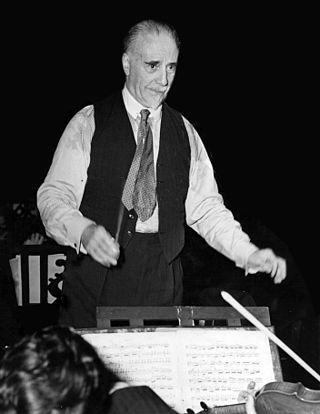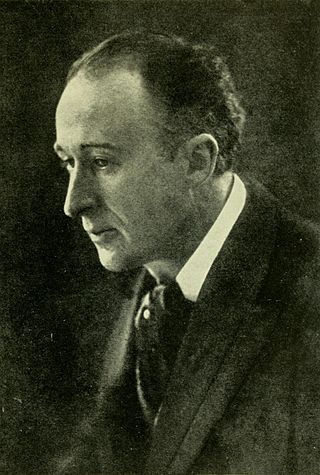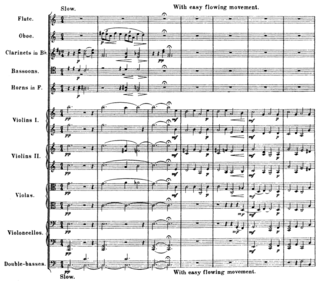Notes, references and sources
Notes
Related Research Articles

Sir Thomas Beecham, 2nd Baronet, CH was an English conductor and impresario best known for his association with the London Philharmonic and the Royal Philharmonic orchestras. He was also closely associated with the Liverpool Philharmonic and Hallé orchestras. From the early 20th century until his death, Beecham was a major influence on the musical life of Britain and, according to the BBC, was Britain's first international conductor.

Frederick Theodore Albert Delius was an English composer. Born in Bradford in the north of England to a prosperous mercantile family, he resisted attempts to recruit him to commerce. He was sent to Florida in the United States in 1884 to manage an orange plantation. He soon neglected his managerial duties, and in 1886 returned to Europe.

Philip Arnold Heseltine, known by the pseudonym Peter Warlock, was a British composer and music critic. The Warlock name, which reflects Heseltine's interest in occult practices, was used for all his published musical works. He is best known as a composer of songs and other vocal music; he also achieved notoriety in his lifetime through his unconventional and often scandalous lifestyle.

Sir Granville Ransome Bantock was a British composer of classical music.

Florent Schmitt was a French composer. He was part of the group known as Les Apaches. His most famous pieces are La tragédie de Salome and Psaume XLVII. He has been described as "one of the most fascinating of France's lesser-known classical composers".

On Hearing the First Cuckoo in Spring is a tone poem composed in 1912 by Frederick Delius. Together with Summer Night on the River it is one of Delius's Two Pieces for Small Orchestra. The two were first performed in Leipzig on 23 October 1913, conducted by Arthur Nikisch. On Hearing the First Cuckoo in Spring is the longer of the two pieces, with a typical playing time of between six and seven minutes. There have been numerous recordings of the piece, which Delius's champion Sir Thomas Beecham described as much the best known of the composer's works.

A Village Romeo and Juliet is an opera by Frederick Delius, the fourth of his six operas. The composer himself, with his wife Jelka, wrote the English-language libretto based on the short story "Romeo und Julia auf dem Dorfe" by the Swiss author Gottfried Keller. The first performance was at the Komische Oper Berlin on 21 February 1907, as Romeo und Julia auf dem Dorfe. Thomas Beecham conducted the British premiere at the Royal Opera House, Covent Garden in London on 22 February 1910. The US premiere was on 26 April 1972 in Washington, D.C.
A Song of Summer is a tone poem for orchestra by Frederick Delius, completed in 1931.

Koanga is an opera written between 1896 and 1897, with music by Frederick Delius and a libretto by Charles Francis Keary, inspired partly by the book The Grandissimes: A Story of Creole Life by George Washington Cable (1880). Inspiration also came from Delius's own experiences as a young man, when his family sent him to work in Florida. It was Delius's third opera, and he thought better of it than of its predecessors, Irmelin and The Magic Fountain, because of the incorporation of dance scenes and his treatment of the choruses. Koanga is reputed to be the first opera in the European tradition to base much of its melodic material on African-American music.
The Florida Suite is an orchestral suite by English composer Frederick Delius. He composed the work in 1887 at Leipzig, after his time as manager of an orange grove in Florida, inspired by its landscape and culture, mainly centred on the St. Johns River. During this time, Delius also studied music with an organist in Jacksonville. This suite is one of the composer's more popular works. The "Daybreak" movement includes a version of the tune "La Calinda", which Delius later used in his opera Koanga.

Frederic William Austin was an English baritone singer, a musical teacher and composer in the period 1905–30. He is perhaps best remembered for his arrangement of Johann Pepusch's music for a 1920 production of The Beggar's Opera by John Gay, and its sequel Polly in 1922; and for his popularization of the melody of the carol The Twelve Days of Christmas. Austin was the older brother of the composer Ernest Austin (1874–1947).
Cecil William Turpie Gray was a Scottish music critic, author and composer.
Sea Drift is among the larger-scale musical works by the composer Frederick Delius. Completed in 1903–04 and first performed in 1906, it is a setting for baritone, chorus and orchestra of words by Walt Whitman.
Frederick Craig Riddle OBE was a British violist. He was considered to be in the line from Lionel Tertis and William Primrose, through to the violists of today such as Lawrence Power.

Friedrich (Fritz) Leopold Cassirer, was a German conductor. He was one of the early proponents of the music of Frederick Delius, and conducted the premiere of Delius's first opera.
Cynara is a setting by Frederick Delius of a poem by Ernest Dowson, for solo baritone voice and orchestra.
Songs of Sunset is a work by Frederick Delius, written in 1906–07, and scored for mezzo-soprano and baritone soli, SATB chorus and large orchestra. The words are by Ernest Dowson.
This is a summary of 1927 in music in the United Kingdom.

Summer Night on the River is a tone poem composed in 1911 by Frederick Delius. Together with On Hearing the First Cuckoo in Spring it is one of Delius's Two Pieces for Small Orchestra. The two were first performed in Leipzig on 23 October 1913, conducted by Arthur Nikisch.
References
- ↑ Hadley, Patrick. "Delius, Frederick", Dictionary of Nationa Biography, Oxford University Press, 1949 (subscription or UK public library membership required)
- ↑ Beecham, p. 51
- 1 2 Dibble, p. 75
- ↑ Beecham, p. 59
- ↑ Dibble, p. 76
- 1 2 3 Anderson, Robert. "Irmelin", Grove Music Online, Oxford University Press, 2002. (subscription required)
- 1 2 Dibble p. 85
- 1 2 Warlock, p. 97
- 1 2 Porter, Andrew. "Opera Diary – Oxford New Theatre: Irmelin (Delius)". Opera , July 1953, Vol. 4, No. 7, pp. 422–425
- ↑ "Frederick Delius". The Manchester Guardian : 6. 11 June 1934.
- 1 2 Dibble, p. 469
- ↑ Banfield, Stephen. "Frederick Delius: a Supplementary Catalogue", Music and Letters, Volume 69, Issue 2, April 1988, Pages 286–287 (subscription required)
- ↑ Beecham, p. 58
- ↑ Dean, Winton. "New Music", The Musical Times, January 1954, p. 27
- ↑ Worldcat entry for BBC recording of Irmelin accessed 5 March 2020.
Sources
- Beecham, Thomas (1975) [1959]. Frederick Delius. Sutton: Severn House. ISBN 0-7278-0099-X.
- Dibble, Jeremy (2021). The Music of Frederick Delius. Woodbridge: Boydell Press. ISBN 978-1-78-744799-8.
- Warlock, Peter (1923). Frederick Delius. London: John Lane. OCLC 1114098833.